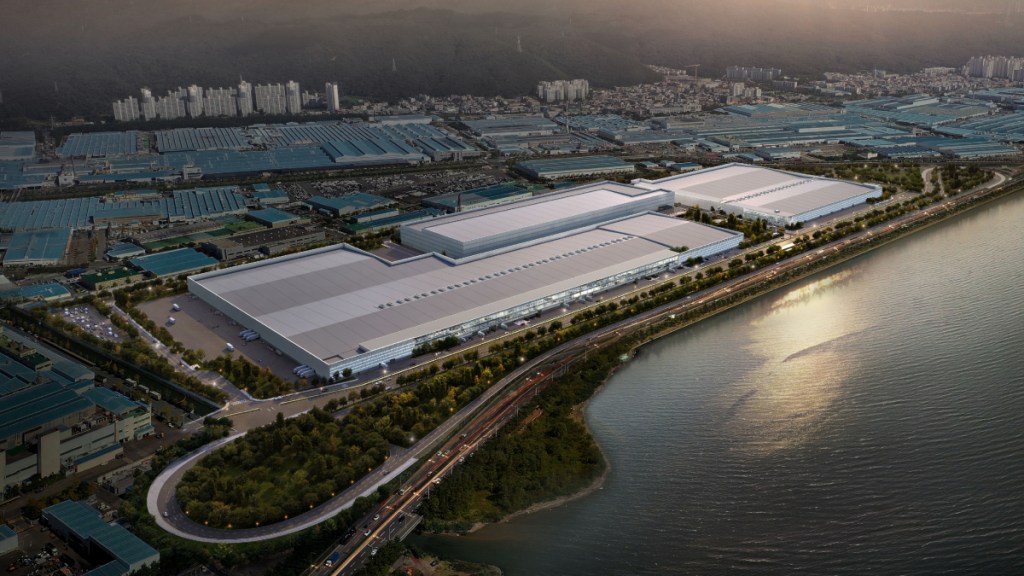Hyundai Motor Company held a groundbreaking ceremony for a new electric vehicle (EV) plant at its complex in Ulsan, the heart of Korea’s automotive industry.
The new EV-dedicated plant will be a human-centered facility with an innovative manufacturing platform that delivers an optimal working environment for employees. It will also be the hub for Hyundai Motor’s mobility production in the era of electrification. With the new plant, Hyundai Motor’s Ulsan Plant complex will become a base of future mobility production.
The ground breaking ceremony was attended by Euisun Chung, Executive Chair of Hyundai Motor Group; Jaehoon Chang, President and CEO of Hyundai Motor Company; and Dong-seock Lee, Executive Vice President, Chief Safety Officer and Head of Domestic Productions for Hyundai Motor Company. They were joined by dignitaries, including Ulsan Metropolitan City Mayor, Doo-gyeom Kim, and First Vice Minister of the Ministry of Trade, Industry and Energy, Youngjin Jang.
“The new EV-dedicated Plant in Ulsan is the beginning of a promising future for the next 50 years and the era of electrification. I am honored to share our dream of a 100-year company here. Just as the dream of building the best car in the past made Ulsan an automotive city today, I trust Ulsan will be an innovative mobility city that leads the way in the era of electrification, starting with a dedicated EV plant,” said Executive Chair Chung.
In his congratulatory remarks, First Vice Minister of Trade, Industry and Energy Young-jin Jang said, “I believe that Hyundai Motor will stand out as a powerhouse in the electric vehicle era with decisive investments. The government will prioritize supporting the improvement of the business investment environment, including bold tax incentives and eliminate regulations that inhibit economic growth.”
The company says the new EV plant in Ulsan builds on the vision of Hyundai Motor’s Founding Chairman Ju-yung Chung (1915-2001), who believed the car industry would become the cornerstone of the Korean economy and underpin the country’s industrial development. More than half a century ago, he chose Ulsan as the location to help to create a better outlook and realize Korea’s mobility dreams. Now, the new EV plant will build on that legacy with a global impact.
“We have the world’s greatest strength, and that strength is the world’s best craftsmen. I am confident that thanks to their ability and dedication, Korean cars, our cars, will soon take the world by storm.” the Founding Chairman said historically.
His famous quote was reproduced through artificial intelligence (AI) technology and shared at the groundbreaking ceremony, demonstrating the humanistic spirit of Hyundai Motor.
The Hyundai Ulsan Plant is claimed to be the largest single plant in the world.
First new Hyundai plant in Korea after 29 years
Interestingly, the EV-dedicated facility will be Hyundai Motor’s first new plant in Korea in 29 years, following the opening of the Asan plant in 1996.
Hyundai Motor’s new EV-dedicated plant in Ulsan will form part of a 548,000 square metre site with a capacity to produce 200,000 EVs per year. Approximately 2 trillion Korean won ($1.53 billion) will be invested in the project, with full-scale construction set to begin in the fourth quarter of this year. The construction is scheduled to be completed in 2025, and vehicle mass production will commence in the first quarter of 2026. An e-SUV from Hyundai Motor Group luxury brand, Genesis, will be the first model to be produced at the new plant.
In this historic place, Hyundai Motor developed high-quality global models such as the Sonata, Accent and Elantra (badged Avante in South Korea). In 1991, Hyundai Motor’s first EV prototype, Sonata (Y2) EV, was developed, and the following year, the first driverless car successfully completed its initial test drive on the Belgian Road test track.
The Korean carmaker plans to apply an innovative manufacturing platform that was developed by the Hyundai Motor Group Innovation Center in Singapore (HMGICS) at its dedicated EV plant in Ulsan to future-proof the facility and prioritize employee safety, convenience and efficiency.
HMGICS’ manufacturing innovation platform includes demand-driven, AI-based intelligent control systems; eco-friendly, low-carbon construction methods to achieve carbon neutrality and RE100 certification (100 percent renewable energy use); and human-friendly facilities that enable safe, efficient working.
The company will use this to build a smart logistics system, including automated parts logistics, at the new EV plant. It will introduce a flexible production system to diversify vehicle models, respond to global market changes and automate assembly facilities to improve productivity and quality.
The company plans to create a safer, more accurate and efficient workplace with innovative technologies, such as robotics, smart logistics systems and AI to improve the working environment.



















